LITTLE CHILDREN, LOVE ONE ANOTHER:
MISSION AND UNITY
How do you overcome an enemy that is stronger than you? How do you defeat a force that seems able to easily overpower you? How do you even gather up the courage to do anything when your foe is better equipped, better trained, and you have nothing but failure?
These questions could apply to many different conflicts and struggles; real battles, spiritual struggles, and personal crises. As we consider how weve been gathered up into Gods mission, we have to the realization that aligning ourselves and our congregation with Gods mission and kingdom rule puts us at odds with other forces and powers. Declaring allegiance to God means that we suddenly have an enemy. Peace treaties or non-aggression pacts with these enemies arent an option, even though we may be tricked into thinking that is the case. Commitment to the mission of God means facing our common foe. If we have any hope of overcoming that enemy and participating in Gods mission, then we must be united ...
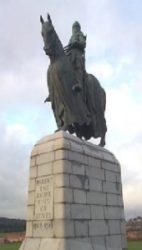 Many years ago I took a trip to Scotland and noticed this statue of a proud knight upon a war horse. I learned that there was an inspiring story behind this monument that took place on the field where I was standing. It is a story about the many people of Scotland and a would-be king who challenged an enemy that was much stronger. It is a true story but I hope you will hear it as a sort of parable taken from history ...
Many years ago I took a trip to Scotland and noticed this statue of a proud knight upon a war horse. I learned that there was an inspiring story behind this monument that took place on the field where I was standing. It is a story about the many people of Scotland and a would-be king who challenged an enemy that was much stronger. It is a true story but I hope you will hear it as a sort of parable taken from history ...
The knight on the horse is Robert the Bruce, King of the Scots. He was crowned in 1306, but accepting the throne of Scotland made him an enemy of the King of England, Edward I, who claimed to be the rightful ruler of Scotland. For another year, Edward hunted Robert the Bruce to punish him for treason. He captured Bruces family and held them hostage. Before Edward died in 1307 he commanded his son, Edward II to continue the fight until Scotland was subjugated and he ordered that his cremated bones be carried in a box before the armies of England in their final assault on Scotland.
Robert the Bruce didnt have much to work with. Scotland at that point was seriously divided. The clans in the North Highlands were ruled by local chieftains and they were mostly occupied with the ancient feuds with one another. The lands in the south were ruled by noblemen who were related to the royal families of England and Europe. Scotlands last king had died without an obvious successor to the throne. The noble families were at odds with one another as they contested over who should rule Scotland.
 In the midst of Scotlands division, Edward I of England graciously offered to judge between the claimants, but in the process he kept Scotland divided and eventually claimed the throne for himself. He was able to hold onto his rule over Scotland as long as he kept the people at odds with one another. They were so busy fighting each other that they could not stand against England. Edward kept the leaders of Scotland subdued and earned his nickname, the Hammer of the Scots.
In the midst of Scotlands division, Edward I of England graciously offered to judge between the claimants, but in the process he kept Scotland divided and eventually claimed the throne for himself. He was able to hold onto his rule over Scotland as long as he kept the people at odds with one another. They were so busy fighting each other that they could not stand against England. Edward kept the leaders of Scotland subdued and earned his nickname, the Hammer of the Scots.
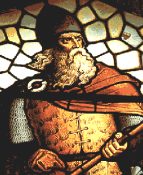 There was one exception. William Wallace, the subject of the movie Braveheart, was the guardian of Scotland during this period. He refused to compromise with Edward. He fought until he was captured and executed. His single-minded leadership set the way for Robert the Bruce, who was one of the claimants to the throne.
There was one exception. William Wallace, the subject of the movie Braveheart, was the guardian of Scotland during this period. He refused to compromise with Edward. He fought until he was captured and executed. His single-minded leadership set the way for Robert the Bruce, who was one of the claimants to the throne.
After crowning himself king in 1306 and so defying Edward, Bruce was on the run. Along the way and through his many trials he made allies throughout Scotland and imagined a united Scotland that could stand together against a common foe. Eight years later, King Robert Bruce was finally prepared to confront the army of Edward II of England. In June of 1314, Bruces rag-tag army of 5000 comprised of knights, peasants, nobles, commoners, and assorted Highland clans camped at the field near Bannockburn and waited for the advance of the English Army led by Edward II and the cremated bones of the Hammer of the Scots. The English army outnumbered the Scots 4 to 1, they were better equipped, had better armor, had more specialized weapons, and better training. And yet, the smaller Scottish army won the Battle and secured their freedom from England. Robert the Bruces long mission had borne fruit at last. Bannockburn is a significant victory not only because Scots won, but they overcame their real enemy. As one of Scotlands 20th century writers put it: Scotland's fatal weakness has always been -- and Wallace, and later Bruce, both sought to counter it -- a preference for hair-splitting and squabbling amongst ourselves, forgetting the great objectives in the means thereto (Nigel Tranter)
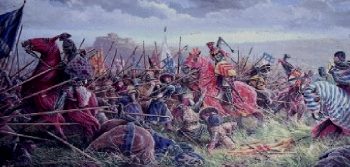
Battle at Bannockburn
Just as Edwards strategy was to keep the clans and nobles of Scotland divided, so it is our enemys strategy to keep us divided. Like the Scots, our preference for hair-splitting and squabbling amongst ourselves distracts us from the greater objectives. If King Robert the Bruce could unite the factions of Scotland at Bannockburn, then I should think that our King, Jesus Christ, can all the more unite us and assemble us for his mission. Unity is Jesus strategy also. On the night that he was betrayed, Jesus prayed for his disciples in these words recorded in John 17
18As you sent me into the world, I have sent them into the world. 19For them I sanctify myself, that they too may be truly sanctified. 20"My prayer is not for them alone. I pray also for those who will believe in me through their message, 21that all of them may be one, Father, just as you are in me and I am in you. May they also be in us so that the world may believe that you have sent me. 22I have given them the glory that you gave me, that they may be one as we are one: 23I in them and you in me. May they be brought to complete unity to let the world know that you sent me and have loved them even as you have loved me. 24"Father, I want those you have given me to be with me where I am, and to see my glory, the glory you have given me because you loved me before the creation of the world. 25"Righteous Father, though the world does not know you, I know you, and they know that you have sent me. 26I have made you known to them, and will continue to make you known in order that the love you have for me may be in them and that I myself may be in them."
Unity and Mission The petition of Jesus, the purpose of the prayer and the teaching is that we might be one with God, Jesus, and with one another. The purpose of this unity is not simply that we might feel good or the avoidance of conflict it has a purpose that is directly connected to the mission: That the world might know God. Jesus intends to call us together as a unified church so that lost people he loves will come to know God. He prays for us because our unity is essential to our participation in his mission. The question for us is not whether Christ shall succeed he shall! Rather the question is whether we will be his partners in that mission or whether he fulfill without us. Since unity is that important, you can imagine how the enemy will make every effort to destroy unity. Since many of our internal squabbles and issues have nothing to do with Gods mission, if the enemy can keep us divided, then we are not on mission
I see two extremes that threaten our unity. First is a tendency toward unchecked anger and frustration. There is no sin in being frustrated with others or even with the things that are happening in the church. Theres no sin in disagreeing with the way some things are managed. Sometimes the leaders of an effort or a ministry are themselves frustrated about it because in our imperfect world things dont always go as we intend. Imperfect people and imperfect plans are bound to upset us. But each of us is responsible for the way we handle our frustration, our disappointment, our anxiety, and our fear. We read in Genesis 4 that God did not condemn Cain for being angry and upset, rather he encouraged Cain to master the sin that was crouching at his door because it wanted to consume him. God is warning Cain to preserve love and unity, but if he gives in to his anger then the enemy will have his way with him! Cain did not resist the enemy at his door. As a result, he lost a brother and God found himself in the unfortunate position of punishing one of his beloved children in order to seek justice for another beloved child now dead. Giving in to the enemy by not managing our anxiety and frustration gives the enemy an advantage and it grieves our Father. You dont think he wants to judge between his children, do you?
A second tendency that threatens our unity is the extreme individualism of our culture that has even affected the way we view our relationships within the church as well as outside the church. We have reduced faith to the point that it really means nothing more than my personal relationship with God and in our culture God means "the god of my understanding." Dont misunderstand, I do believe that all of us have a personal, intimate relationship with Jesus Christ, but it doesnt end there there is so much more. Gods vision of salvation is more than just an amnesty program that gives everyone who will listen a chance to pay their dues before the deadline arrives. God is interested in saving each of us, but he also wants to redeem our relationships with one another. God intends for us to live together in peace with each other and with the creation. Isaiah shares the Lords vision of the kingdom of God with us. God speaks of that age saying, "They will not hurt or destroy on all my holy mountain; for the earth will be full of the knowledge of the Lord as the waters cover the sea." (Isaiah 11:9). If we are full of the knowledge of the Lord, in other words if we are as one with God and Jesus as Christ prayed we should be, then we are compelled to love one another. We cannot be indifferent and exhibit the apathetic tolerance of our age that says, "Well to each his own, and I have to do what is right for me." Jesus did not die on the cross because it was right for him. He died for the sake of the world "that God so loved." Let us no longer reduce ourselves to religious consumers shopping for the church or synagogue of our choice. Likewise, lets not reduce this congregation to a spiritual supermarket, a sort of Wal-Mart of religion, trying to please the customers with user-friendly services and goods for people of all generations and tastes. Thats not a good model for the church because if all of us show up as customers wanting to be right, then who plays the role of the service managers who are aimed to please: the elders, the ministers, bible class teachers, song leaders, everyone other than you? It just doesnt work. We cannot market the gospel and we cannot market a loving unified community.
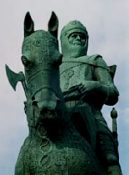
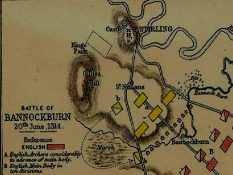
Unity doesnt mean we are all exactly alike, in fact it means quite the opposite. If we want everyone to be just like us then thats uniformity. Robert the Bruces army on the filed of Bannockburn was not uniform. That was the strength of the King of England who commanded over 20,000 troops comprised of 2500 cavalrymen each decked out in the finest heavy armor and equipped with a 12-foot lance and battle axe in addition to shield and sword, 3000 well-trained Welsh archers who could each launch 5 arrows at a time, and over 15,000 foot soldiers uniform in perfect formation with their quilted coats, steel helmets, and armed with shield, sword and spear. King Roberts army was only 5000 and they were in truth a sort of conglomeration of smaller armies drawn from all regions of Scotland. The commanders of these troops were landowners or city officials who fought alongside poor peasants from their region; sometimes on horse but often on foot. Since they didnt have the wealth of their English enemy, they fought with whatever deadly instruments they could find or improvise and their armor, if they had any, was a patchwork of pieces taken as spoils from previous wars. The King himself commanded the largest of four divisions made up of about 2000 troops gathered from the Highland clans who had muted their ancients feuds beneath the watchful eye of their new monarch. All of his troops were accustomed to rough conditions and they were hard fighters but his greatest challenge would be getting them to work as a collective rather than charge wildly into battle hacking and spearing anything around them.
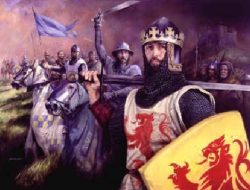 They were hardly uniform, but Bruce knew the common cause that gave them unity. On the night of June 23, 1314 Robert the Bruce assembled his mean and spoke to them: "Our enemies are moved only by desire for dominion but we are fighting for our lives, our children, our wives and the freedom of our country. And so I ask and pray that with all your strength, without cowardice or alarm, you meet the foes whom you will first encounter so boldly that those behind them will tremble. See that your ranks are not broken so that when the enemy come charging on horseback you meet them steadfastly with your spears ... You could have lived quietly as slaves, but because you longed to be free you are here with me, and to gain that end you must be valiant, strong and undismayed."
They were hardly uniform, but Bruce knew the common cause that gave them unity. On the night of June 23, 1314 Robert the Bruce assembled his mean and spoke to them: "Our enemies are moved only by desire for dominion but we are fighting for our lives, our children, our wives and the freedom of our country. And so I ask and pray that with all your strength, without cowardice or alarm, you meet the foes whom you will first encounter so boldly that those behind them will tremble. See that your ranks are not broken so that when the enemy come charging on horseback you meet them steadfastly with your spears ... You could have lived quietly as slaves, but because you longed to be free you are here with me, and to gain that end you must be valiant, strong and undismayed."
What does this lesson in unity from a Scottish king have to do with us? Our weapons are not spears and swords. Our fight is not with flesh and blood.
1) Unity and a common foe: The enemy is Satan. The enemy is the spiritual forces of evil in the heavenly realms. Our struggle is against the principalities and powers. May God give us eyes to see the spiritual realities so we may see the battlefield where the very souls of men and women are at stake. We will unite in the face of such powers and lay aside our personal quarrels.
2) Unity and Love as our strength and our Freedom. During President Bushs Inauguration speech I heard a definition of liberty and freedom that is rarely heard in America today: "Liberty for all does not mean independence from one another. Our nation relies on men and women who look after a neighbor and surround the lost with love." Thats quite a unique perspective affirming that we do need each another and we need to be united. Voices from conservative and liberal corners have often characterized freedom as something very personal and individual. I hope this better definition catches on. It ought to be the standard in the church if not America ... We cannot truly preach Jesus and his gospel if we are not united with one another and with the Father. If we are not united, then the world cannot know Jesus through us because we do not know him.
1 John 3:23-24: And this is his commandment, that we believe in the name of his Son Jesus Christ and love one another, just as he has commanded us. Whoever keeps his commandments abides in him, and he in them. Jerome says, that when John was an old man in Ephesus, he had to be carried to the church in the arms of his disciples. At these meetings, he was accustomed to say no more than, "Little children, love one another!" After a time, the disciples wearied at always hearing the same words. They asked, "Master, why do you always say this?" "It is the Lord's command," was his reply. "And if this alone be done, it is enough!"
Words of Jesus His prayer. All will know you are my disciples if what ...? If you love one another. (John 13:35) Dont let your ranks be broken!
Discussion Guide
- What is the connection between unity and mission? Why is unity so important?
- What often compromises our unity? What about the two tendencies mentioned in the sermon: (unmanaged anxiety and frustration; individualism)? Can you think of other ways the enemy divides us?
- Why are we so consumed with being consumers? How can we resist the spirit of the age that urges us to be individuals at the expense of community?
- How can we promote unity in the congregation? What are some well-intentioned ways we actually create isolation from one another?
- What does our relationship with God and Christ have to do with our relationships with one another?
- Key texts to read: Psalm 133, I John 3; John 17
|
Chris Benjamin
West-Ark Church of Christ, Fort Smith, AR
Morning Sermon, 23 January 2005
 Link to next sermon
Link to next sermon
 Link to other sermons of Chris Benjamin
Link to other sermons of Chris Benjamin
 Many years ago I took a trip to Scotland and noticed this statue of a proud knight upon a war horse. I learned that there was an inspiring story behind this monument that took place on the field where I was standing. It is a story about the many people of Scotland and a would-be king who challenged an enemy that was much stronger. It is a true story but I hope you will hear it as a sort of parable taken from history ...
Many years ago I took a trip to Scotland and noticed this statue of a proud knight upon a war horse. I learned that there was an inspiring story behind this monument that took place on the field where I was standing. It is a story about the many people of Scotland and a would-be king who challenged an enemy that was much stronger. It is a true story but I hope you will hear it as a sort of parable taken from history ...
 In the midst of Scotlands division, Edward I of England graciously offered to judge between the claimants, but in the process he kept Scotland divided and eventually claimed the throne for himself. He was able to hold onto his rule over Scotland as long as he kept the people at odds with one another. They were so busy fighting each other that they could not stand against England. Edward kept the leaders of Scotland subdued and earned his nickname, the Hammer of the Scots.
In the midst of Scotlands division, Edward I of England graciously offered to judge between the claimants, but in the process he kept Scotland divided and eventually claimed the throne for himself. He was able to hold onto his rule over Scotland as long as he kept the people at odds with one another. They were so busy fighting each other that they could not stand against England. Edward kept the leaders of Scotland subdued and earned his nickname, the Hammer of the Scots.
 There was one exception. William Wallace, the subject of the movie Braveheart, was the guardian of Scotland during this period. He refused to compromise with Edward. He fought until he was captured and executed. His single-minded leadership set the way for Robert the Bruce, who was one of the claimants to the throne.
There was one exception. William Wallace, the subject of the movie Braveheart, was the guardian of Scotland during this period. He refused to compromise with Edward. He fought until he was captured and executed. His single-minded leadership set the way for Robert the Bruce, who was one of the claimants to the throne.



 They were hardly uniform, but Bruce knew the common cause that gave them unity. On the night of June 23, 1314 Robert the Bruce assembled his mean and spoke to them: "Our enemies are moved only by desire for dominion but we are fighting for our lives, our children, our wives and the freedom of our country. And so I ask and pray that with all your strength, without cowardice or alarm, you meet the foes whom you will first encounter so boldly that those behind them will tremble. See that your ranks are not broken so that when the enemy come charging on horseback you meet them steadfastly with your spears ... You could have lived quietly as slaves, but because you longed to be free you are here with me, and to gain that end you must be valiant, strong and undismayed."
They were hardly uniform, but Bruce knew the common cause that gave them unity. On the night of June 23, 1314 Robert the Bruce assembled his mean and spoke to them: "Our enemies are moved only by desire for dominion but we are fighting for our lives, our children, our wives and the freedom of our country. And so I ask and pray that with all your strength, without cowardice or alarm, you meet the foes whom you will first encounter so boldly that those behind them will tremble. See that your ranks are not broken so that when the enemy come charging on horseback you meet them steadfastly with your spears ... You could have lived quietly as slaves, but because you longed to be free you are here with me, and to gain that end you must be valiant, strong and undismayed."

